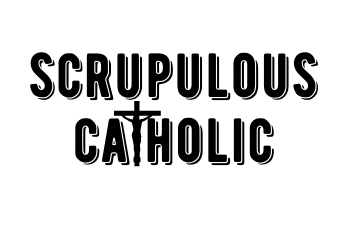What is Scrupulosity?
Scrupulosity is a religious obsessive-compulsive disorder in which a sufferer is excessively afraid of offending God.
Individuals with scrupulous consciences tend to be too cautious of all their actions resulting in doubt if these are sinful or not.
Here are examples of scrupulous conscience.
Confession
Confession should be the place to feel good after absolution, but this was not the case for me.
Before the confession, I made sure that I already memorized all the sins I thought I committed. I even had mnemonics to remember all of them.
Even though I knew some were not what I was guilty of, I still confessed them to the priest.
While confessing, I had to finish the list in my mind, if there was a chance I missed even just one, I would interrupt the confessor during the absolution and ask him if I could add more.
If he responded no need, I would accept it. But if I forgot the sins, I would go to another priest to confess them.
It came to a point that I confessed my sins twice a day because I felt my sins had not been forgiven yet.
RELATED– Prayer Journal for Scrupulous
Prayer
Sadly, prayer time which was supposed to be a silent moment to reflect became a battleground of intrusive thoughts.
Having intrusive thoughts is a sign of scrupulosity. These are unwanted ideas that suddenly enter one’s mind, usually, disturbing and profane. Having these thoughts are normal for the scrupulous because as I mentioned, the fear of hurting God would now become extreme.
While praying, intrusive thoughts came like a lion that kept on roaring and never stopped.
All I had to do was to repeat the prayers. Yes, I had to repeat the prayers and not wait until the thoughts were gone because they just would not.
I pray multiple times a day, Rosary, 3’oclock Prayer, Angelus, and devotions depending on the day so it was constant torture for me.
In addition, I even developed a compulsion, the Act of Contrition.
When dirty thoughts chimed in, I always felt I sinned hence, I recited that prayer. So every time I pray with intrusive thoughts, it took me a long time to finish even a short prayer.
Daily life
One example of scrupulous conscience affecting my day-to-day tasks was how I ate.
Since I considered almost everything I do might be a sin, the way I ate was no excuse.
Like any other sins I will be mentioning later, I was afraid of gluttony.
The fact that gluttony is subjective and has no definite rule, was an easy target of my catholic guilt.
I lost so much weight. I only had three spoons of rice and a small amount of viand. Whenever I craved for more, my mind would automatically suggest it as a sin, thus, I rejected it.
Scrupulosity also affected the way I bond with my family.
Sharing about something or someone was usual for us until I became aloof because I was careful not to share too much for it might lead to gossiping.
Socially, I was absent.
I was there with them but never talk that much. I analyzed first everything I needed to say to make sure they were not sinful.
As a self-proclaimed friendly guy, it was hard for me to avoid my workmates turned friends because of their religious beliefs.
“Extra Ecclesiam nulla Salus” or Outside the Church, there is no salvation in English became my rigid stand at that time.
I shunned interacting with them. I thought that talking to them was a grievous sin.
The same was true with my relatives and friends who are in the state of mortal sins.
I always assumed that I somehow was tolerating them if I talk to them.
Apart from that, I also avoided buying products or services owned by individuals who do not share my religious belief. If I accidentally did, I would always feel guilty and end up in a confessional.
Another example of scrupulous conscience was the feeling of unworthily receiving the Eucharist every Sunday.
This was my constant struggle. I was always doubtful if I was worthy of accepting Him in the Sacrament.
On Saturdays, I would go to our nearest Church to ask for forgiveness for my sins in the confession. The time between after the confession and before attending the Mass was the hardest. The intrusive thoughts would start to boggle my mind, leading me to doubt if I committed sins or not. It was in those moments that a tug of war in my mind would happen and convince me that I sinned, therefore, I would forcefully travel around our area to look for Churches that offered confessions on Sunday.
It was tiring and exhausting but I just had to do it to feel deserving in receiving Him in the Eucharist.
Also, the preparation before Communion drove my OCD to its peak. The statement below coming from the canon was the main source of this obsession.
Canon 919 “1. One who is to receive the Most Holy Eucharist is to abstain from any food or drink, with the exception only of water and medicine, for at least the period of one hour before Holy Communion.”
To some, this might be a rule not to worry about but, the effect on me who has OCD was extreme.
I tended to brush my teeth multiple times, making sure that my mouth was clean and free from residues coming from food. Doubts would always come along the way resulting in an inordinate checking if my mouth was perfectly neat.
If you are struggling with OCD on this as well, you might want to check this Eucharistic Fasting Guide for Scrupulous.
I also consider the legality as a basis if the things are sinful or not.
I assumed that buying goods or services from establishments that do not have the Mayor’s permit or are not registered in the Bureau of Internal Revenue was sinful. That is why I could not eat street food and buy random things in sidewalk stores. I knew if I did, I would get confused and eventually get persuaded to go to confession.
Also, I stayed away from companies with labor issues.
I boycotted their products, even though it was hard (they monopolized certain industries). I had to make sure, that the food I ate, was free from ingredients coming from the distributors I avoided. Carefully, I would check the details for this could break me and could really bother me the whole day long.
There is no little sin for scrupulous individuals.
There is a chance that they can convert a thing into a grievous fault. They cannot distinguish venial sins from mortal sins.
All they know is that an act of commission or omission that results in sin, aware or not, remorse should follow with confession as the solution.
In the above scenarios of scrupulous conscience, all are concerned with the act of commissions.
But always remember that act of omission is no excuse.
One example of an act of omission relating to scrupulosity was when after confession, I felt I had the duty to correct the wrong practices in my surrounding.
I remember how I picked up trash around our Church because I felt I had the responsibility to do so and if I would not, I thought I could commit a terrible sin.
These are just some of the situational examples of scrupulous conscience.
Each individual has a unique reaction.
I may react differently than others but one common fear is for sure, and that is offending God.
Conclusion
Scrupulosity is a serious mental illness and should be addressed properly.
Through the help of spiritual direction and appropriate psychological treatment, you can control this disorder.
But this is not something you can cure overnight.
It took me months to finally control this doubting disease. It takes a lot of exposure (the technique I used, check it here) to see your improvements.
You might feel alone for now, just like how I felt before being treated, but rest assured that you are not the only one who is struggling with this. We have each other to defeat it. And we have an army of saints who can intercede for us.
As a matter of fact, even saints had the same experience as ours. They accepted it and offered it to God.
We too can do the same with their guidance.
If you are suffering from scrupulous conscience, the best advice I can give is for you to find a spiritual director, usually a priest, who could walk with you along the healing process.
If you do not have one yet, follow this quick guide to find your spiritual director and begin the sessions.
When needed, seek also a mental health professional.
It is best to let your director know your case so that they can recommend if you need psychological help and may refer you to someone they know.
Both your spiritual director and your psychologist or psychiatrist would work hand in hand.
Follow their pieces of advice for this is where the recovery starts.
Check this out, for more resources on scrupulosity.

